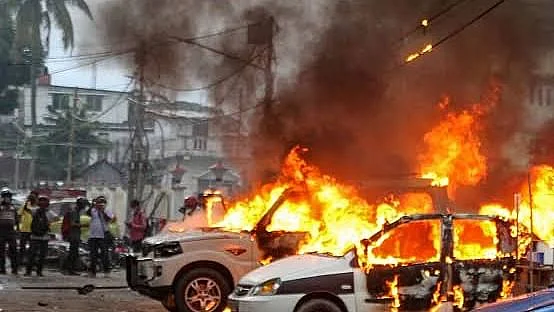Tripura violence staged for polarisation in poll bound states, says fact-finding team
Tripura has stood up to bigotry as it didn’t get swayed by the VHP or Bajrang Dal nor was it provoked to retaliate for targeted attacks on mosques recently, said fact-finding team that visited Tripura

Tripura has stood up to bigotry as it didn’t get swayed by VHP and Bajrang Dal nor was it provoked to retaliate for targeted attacks on mosques recently, said the fact-finding team that visited Tripura after the recent rampage.
“It is also noteworthy that the Muslim community in spite of being the target of the perpetrators of violence had not reacted to any of the provocations and had maintained peace and tranquillity,” said the team.
“Tripura does not have a history of communal violence and strife, but ever since communal people have taken charge in the state, incidents of communal violence and vandalism have started taking place. It seems that the communal violence in Tripura is a part of a political agenda to create communal and religious polarization throughout the country for political gains in other states, where assembly elections are fast approaching,” said Navaid Hamid, president of the All India Muslim Majlis-e-Mushawarat (AIMMM).
He was part of the joint fact-finding team of four Muslim organisations - All India Muslim Majlis-e-Mushawarat (AIMMM), Jamaat-e-Islami Hind (JIH), Markazi Jamiat Ahle Hadees Hind and All India Milli Council – which had returned from Tripura’s violence-affected areas. The delegation had AIMMM President Navaid Hamid, JIH Vice President Prof Salim Engineer, JIH Secretary Maulana Shafi Madani, Jamiat Ahle Hadees secretary Maulana Sheesh Taimi and Milli Council’s Shams Tabrez Qasmi who visited the affected areas from October 31 to November 2, 2021. The team was briefing journalists in Tripura.
The delegation felt that the communal violence had been engineered with a view to building a polarising narrative for the upcoming Assembly elections in states like Uttar Pradesh and Uttarakhand.
“It seems that the communal violence in Tripura is a part of a political agenda to create communal and religious polarization throughout the country for political gains in other states, where assembly elections are fast approaching. The delegation stayed in Tripura for three days and met the victims, the local population including non-Muslims,” added Hamid.
Instead of assisting those affected by the violence which broke out in parts of the state, the police and the administration did not take timely action against perpetrators. “The anti-social elements and communal mischief mongers are emboldened by the belief that they will be shielded by the government. If timely action were taken, then maybe these incidents of violence and vandalism could have been prevented,” pointed out Salim Engineer, JIH vice-president.
While the delegation underscored that the VHP and the Bajrang Dal would not have been able to identify the Muslim-run establishments without local help, they maintained that the Hindus of the affected areas refused to be swayed by the hate campaign.
“If the VHP were sincere about protesting the attacks on Durga Puja pandals in Bangladesh, it would have organised a protest outside the Bangladesh consulate in Agartala instead of attacking Muslims in the state,” added Hamid.
The delegation stayed in Tripura for three days and met the victims, the local population including non-Muslims. The team also tried to meet the chief minister and the Director General of Police of Tripura, but did not get the appointments.
Follow us on: Facebook, Twitter, Google News, Instagram
Join our official telegram channel (@nationalherald) and stay updated with the latest headlines
